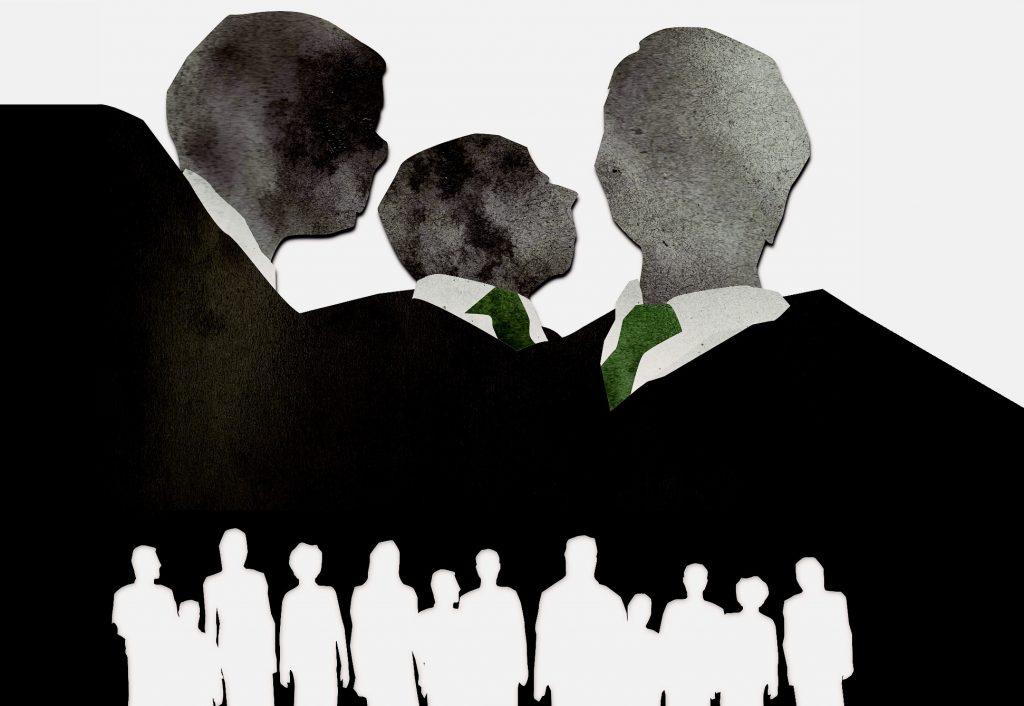Alexis de Tocqueville in his Democracy in America argues that the Western world has been undergoing a 700-year transition from aristocratic cultures with their fixed class systems to highly fluid democratic cultures where equality comes to dominate. Tocqueville claimed that the social classes in aristocratic cultures, though separate, were bound together in relationships of obligation and dependency, a result of which was that their relations were determined by generosity and humility rather than sympathy or resentment.
Indeed, any society must reckon with the ways in which social and economic classes relate to one another, and a well-ordered society will seek to harmonize these class relations justly. A powerful mechanism for doing so relates to ideas of honor and tradition, wherein a person’s well-being relates directly to his or her place not only socially, but geographically as well.
When people have no set place, however, well-being and honor yield to concepts of material success. Not having much intercourse with one another, relations between rich and poor in democratic societies are largely navigated through the use of money. Without propinquity, social life can never aspire to the forms of civic friendship political thinkers have advocated; as a result, the rich will attempt to either pay off the poor or will engage in large-scale projects as a way of psychically buttressing against the caprice of wealth distribution.
In his recent article in the already-essential journal American Affairs, Michael Lind discusses the “new class war” that is consuming American life and politics. According to Lind:
“Following World War II, the democracies of the United States and Europe, along with Japan—determined to avoid a return to depression and committed to undercutting communist anti-capitalist propaganda—adopted variants of cross-class settlements, brokered by national governments between national managerial elites and national labor. Following the Cold War, the global business revolution shattered these social compacts. Through the empowerment of multinational corporations and the creation of transnational supply chains, managerial elites disempowered national labor and national governments and transferred political power from national legislatures to executive agencies, transnational bureaucracies, and treaty organizations. Freed from older constraints, the managerial minorities of Western nations have predictably run amok, using their near-monopoly of power and influence in all sectors—private, public, and nonprofit—to enact policies that advantage their members to the detriment of their fellow citizens. Derided and disempowered, large elements of the native working classes in Western democracies have turned to charismatic tribunes of anti-system populism in electoral rebellions against the selfishness and arrogance of managerial elites.”
Under these circumstances, the elites must find mechanisms that can both assuage their conscience but also keep the working classes from rebelling and thus toppling the order. One would expect the Mark Zuckerbergs of this world to start shilling for a Universal Basic Income.
An important part of the equation, according to Lind, is that the new managerial elite “are for the most part less bigoted and often quite philanthropic.” Because they have sequestered themselves geographically, educationally, and socially – and because the scale of economic and political life has expanded so dramatically – the managerial elite can only relate to their inferiors through large-scale systems and projects. Granted, they give great sums of money to these projects, often accompanied by press fanfare, and usually not enough to create much change in their own standard of living, but often indifferent to the well-being of the actual human beings they will never get to know.
Christopher Lasch had earlier noted that these elites "who control the international flow of money and information" also "preside over philanthropic foundations" and "manage the instruments of cultural production and thus set the terms of public debate." But, he continued, "they have lost faith in the values, or what remains of them, of the West," substituting for the old virtues new concepts of identity, self-esteem, and therapeutic well-being. As a society, Lasch argued, "we are content to institutionalize competence in the caring class, which arrogates to itself the job of looking out for everybody else" (regardless of whether everyone else wants it or not). Such "looking out" will necessarily result in the formation and management of "systems."
This too is part of a strategy of domination, predicated on meritocratic worth. Lind: “The private, public, and nonprofit sectors in modern developed nations do not have separate and distinct elites that can be counted upon to check each other. Instead, the private sector tends to dominate the public sector through campaign finance, and the nonprofit sector through donations. … Managerial dominance is reinforced by lateral mobility at the top levels of society. Diplomats become investment bankers, investment bankers become ambassadors, generals sit on corporate boards, and corporate executives sit on nonprofit boards.”
Philanthropy can thus become a mechanism for both protecting and exercising power. The position of the new elites, finagled though the dominance of technology and financialization as well as management of the labor pool both through arbitrage and education, requires large-scale philanthropic enterprises as mechanisms to protect their privilege.
Photo credit: Truthout.org via Visual hunt / CC BY-NC-SA (slight modifications were made)






